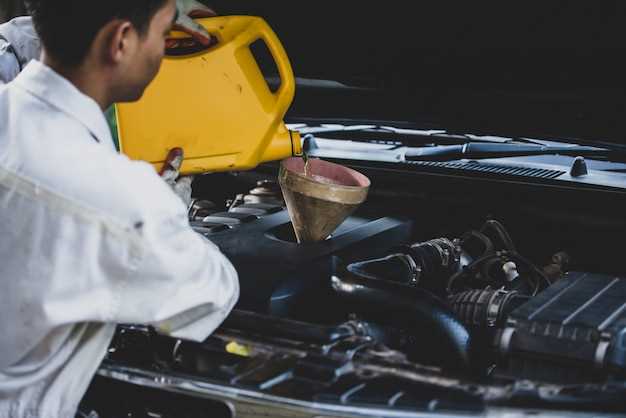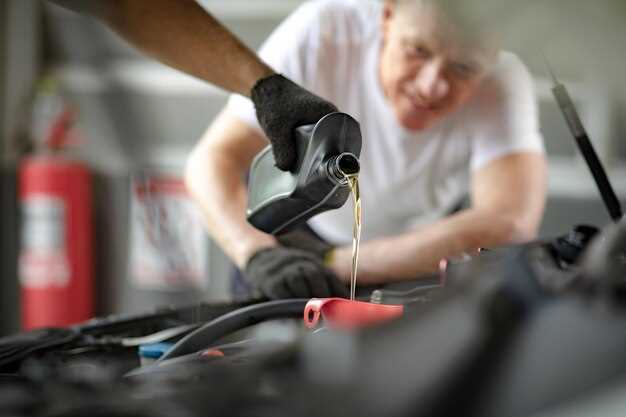
Maintaining optimal engine performance is crucial for the longevity of any vehicle. One of the critical components that contribute to this performance is the oil cooler. This device plays a vital role in regulating the temperature of the engine oil, ensuring it remains at an ideal level for efficient operation.
As engines work hard, they generate heat, and unchecked temperatures can lead to rapid oil degradation. When oil overheats, it loses its ability to lubricate effectively, resulting in increased friction and wear on engine components. An effective oil cooler helps to control this heat, preserving the oil’s integrity and enhancing the overall lifespan of the engine.
Incorporating an oil cooler into an engine system is not merely an option but a necessity for those seeking to maximize reliability and performance. By efficiently managing oil temperatures, these coolers safeguard against premature wear and catastrophic failures, underscoring their importance in maintaining engine health and longevity.
Understanding Engine Temperature Dynamics
The performance and longevity of an engine are significantly influenced by its temperature dynamics. Effective temperature management is essential to prevent overheating, which can lead to severe damage. An oil cooler plays a pivotal role in controlling the engine’s temperature by maintaining optimal oil viscosity and ensuring efficient lubrication.
Engines generate heat through combustion and friction, necessitating a system to dissipate this heat. When engine temperature rises beyond the recommended range, it can cause components to warp, wear prematurely, or fail abruptly. A well-functioning cooler helps to regulate this temperature by transferring heat away from the engine oil, allowing the lubricant to perform its essential functions effectively.
Oil coolers operate by circulating engine oil through a network of tubes or fins, where it exchanges heat with air or coolant. This process not only reduces the oil temperature but also enhances its ability to protect engine parts. As temperatures are controlled, the engine can perform more efficiently, reducing the risk of breakdowns and extending its overall lifespan.
In conclusion, understanding the dynamics of engine temperature is crucial for maintaining performance and reliability. A high-quality oil cooler is an indispensable component for managing heat, ensuring that the engine operates within safe temperature limits, thus enhancing longevity and efficiency.
How Oil Coolers Work to Regulate Temperature
Oil coolers are essential components in many engines, serving to control the temperature of engine oil under varying operating conditions. As the engine runs, friction and combustion generate heat, causing the oil temperature to rise. If this heat is not managed effectively, the oil can break down, leading to premature wear and decreased efficiency.
Oil coolers operate by circulating oil through a series of passages designed to dissipate heat. The cooler consists of a set of fins that increase the surface area exposed to airflow, and these fins are often positioned in a way that maximizes contact with surrounding air. As hot oil flows through the cooler, it transfers heat to the fins and the airflow reduces the oil’s temperature before it re-enters the engine.
In addition to passive cooling, some systems use additional methods such as oil pumps to enhance the flow rate through the cooler, especially during high-performance situations where oil temperature can spike dramatically. This active circulation helps ensure that the oil remains within an optimal temperature range, further prolonging the lifespan of the engine.
By effectively managing oil temperature, coolers play a critical role in maintaining proper lubrication, reducing the risk of engine damage, and enhancing overall performance. Their ability to cool and regulate oil is vital for ensuring that engines operate efficiently and reliably over time.
Signs of Overheating and Oil Breakdowns
Recognizing the signs of overheating and oil breakdown is crucial for maintaining engine health. One primary symptom of excessive temperature is the warning light on the dashboard. When the engine reaches critical temperatures, this light typically illuminates, indicating that immediate action is required.
Another key indicator is a noticeable change in engine performance. If the engine starts to misfire or hesitates during acceleration, it may be a result of compromised oil due to overheating. Over time, oil can break down, losing its viscosity and ability to lubricate effectively, which can lead to increased friction and heat within the engine components.
Unusual smells can also signal oil breakdown. A burnt oil smell is often an indication that the oil has overheated and is degrading, which can lead to potential failures if not addressed promptly. Additionally, check for oil leaks; as the oil degrades, it may become less effective at sealing engine components, resulting in leaks.
Monitoring the oil temperature directly can also provide insights. If the temperature exceeds the manufacturer’s recommended limit, it is essential to inspect the oil cooler and associated systems. An inefficient cooler may lead to higher oil temperatures, accelerating the breakdown process.
Regularly checking the oil’s physical condition is vital. If the oil appears dark and gritty or has a milky texture, these are signs of contamination and thermal degradation. Maintaining proper oil levels and temperatures through effective cooling solutions is key to ensuring longevity and performance of the engine.
Choosing the Right Oil Cooler for Your Engine Type

Selecting the proper oil cooler is crucial for maintaining optimal engine temperature and ensuring longevity. Different engine types demand specific coolers to efficiently manage oil temperature, which directly impacts performance and durability.
Here are essential considerations for choosing the right oil cooler for your engine type:
- Engine Size and Type: Larger and more powerful engines often generate more heat. High-performance or turbocharged engines may require heavy-duty oil coolers to manage the increased oil temperatures.
- Mounting Space: Evaluate the available space in your vehicle when selecting an oil cooler. Some engines have limited room, which may necessitate compact or custom designs.
- Oil Flow Rates: Ensure that the oil cooler can handle the specific flow rates of your engine’s oil system. Insufficient flow can lead to inadequate cooling and possible engine damage.
There are two main types of oil coolers:
- Air-Cooled Oil Coolers: These efficient units use airflow to dissipate heat. They’re ideal for racing engines where maximum airflow is available.
- Liquid-Cooled Oil Coolers: These integrate with the vehicle’s cooling system, using coolant to manage oil temperature. They are suitable for high-compression or heavily loaded engines.
Additionally, consider the following features when choosing an oil cooler:
- Material: Aluminum coolers provide excellent heat dissipation and are lightweight, while steel options offer durability but may be heavier.
- Core Size: A larger core can improve efficiency, but ensure it fits your vehicle’s specifications and doesn’t obstruct airflow to other crucial components.
- Fitting Type: Make sure the cooler’s fittings match your engine’s oil lines for easy installation and leak prevention.
Ultimately, choosing the right oil cooler involves understanding your engine’s specific requirements and considering the operating conditions it faces. Investing in a quality oil cooler designed for your engine type can significantly enhance the reliability and lifespan of your vehicle.
Maintenance Tips for Oil Coolers to Extend Lifespan
Regular inspection of the oil cooler is essential for detecting potential issues early. Check for any signs of leaks, corrosion, or physical damage that may affect its performance. Addressing these problems promptly can prevent further damage to the engine.
Ensure the oil cooler is clean and free from debris. Accumulation of dirt and contaminants can hinder its efficiency. A thorough cleaning can improve the cooler’s ability to control oil temperatures effectively, allowing the engine to operate optimally.
Monitor the oil quality regularly. Changing the oil at recommended intervals not only keeps the oil cooler functioning properly but also extends its lifespan. Contaminated oil may lead to premature wear and clogging of the cooler.
Check the coolant level and quality in systems that use combined oil and coolant coolers. Overheating can occur if the coolant is low or degraded, potentially damaging the oil cooler and the engine. Maintain proper levels to ensure effective temperature control.
Utilize high-quality oil that meets manufacturer specifications. The right oil minimizes the risk of sludge buildup and helps maintain the oil cooler’s efficiency. Research and select products known for their performance in high-stress conditions.
Consider the environment where the vehicle operates. Extreme temperatures, harsh conditions, or prolonged idling can affect oil performance and, consequently, the cooler’s longevity. Adjust maintenance practices based on these factors to ensure reliable operation.
Regularly check and replace any damaged hoses connected to the oil cooler. Wear and tear on hoses can lead to leaks, impacting the cooler’s effectiveness. Ensuring these components are in good condition supports optimal oil flow and temperature regulation.
Consult a professional mechanic for periodic maintenance checks. Their expertise can identify issues that may not be visible during routine inspections, ensuring the oil cooler remains in good working condition and significantly extending its lifespan.
The Impact of Oil Quality on Cooling Efficiency

The quality of oil used in an engine plays a crucial role in the cooling efficiency of oil coolers. High-quality oil possesses superior thermal properties, which enhance its ability to absorb and dissipate heat. This characteristic is vital for maintaining optimal engine temperatures, preventing overheating, and ensuring longevity.
When it comes to controlling the temperature within the engine, the oil acts as a medium for heat transfer. If the oil is of low quality, its thermal conductivity declines, reducing the effectiveness of the cooler. Consequently, lower-quality oils can lead to increased engine temperatures, which accelerates wear and tear on engine components.
Moreover, high-quality oil often contains additives that improve its viscosity and stability under varying temperatures. These additives help maintain a consistent film between moving parts, ensuring that the oil cooler operates efficiently. When oil quality deteriorates, it can become less effective in controlling heat, resulting in potential engine damage.
Regular oil changes with high-grade oils can significantly enhance the performance of oil coolers. By ensuring that the oil remains clean and effective, engine operators can maintain better control over engine temperatures, thereby extending the lifespan of the engine and its components.
